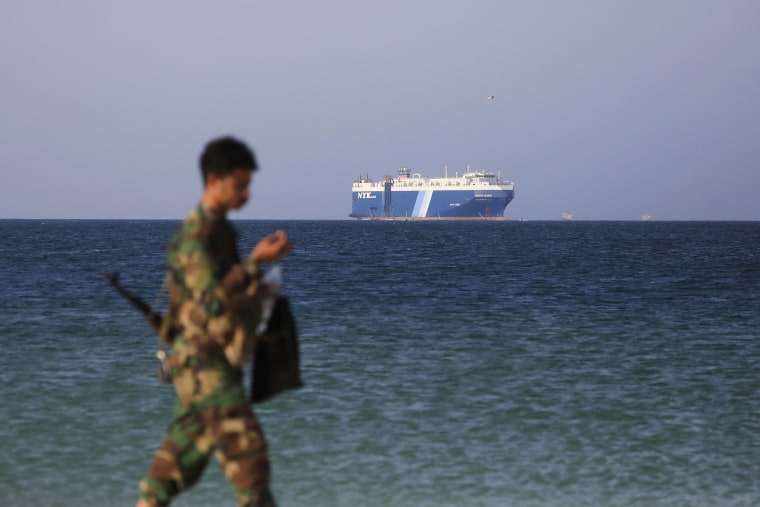
A Houthi soldier walks along a beach with a cargo ship in the background on the Red Sea, off the coast of Hodeidah, Yemen last month. (Yahya Arhab / EPA via Shutterstock)
Yemen’s Houthi rebels, battle-hardened and supported by Iran, have recently intensified their attacks on Israel and commercial ships in the Red Sea. This has raised concerns about a broader regional conflict, amidst the ongoing war in Gaza and escalating tensions between Israel and Hezbollah fighters in Lebanon.
Who Are the Houthis?
The Houthi rebels are an extremist group from Yemen’s northwestern Saada province. They adhere to Zaydism, a branch of Shiite Islam, and originated from a large clan. Seeking greater autonomy for Yemen’s provinces and protection against Sunni Islam, they launched an uprising in 2004 led by their former leader, Hussein Badr al-Din al-Houthi. After gaining control of Saada, they swept into the capital, Sanaa, in 2014, forcing the Yemeni government into exile.
What’s Their Role in the Conflict?
The Houthi rebels drew the attention of neighboring Saudi Arabia, which saw their rise as a threat due to Iran’s support. In response, Saudi Arabia initiated a war against the Houthis. Despite backing from the United States and other nations, the conflict has lasted longer than expected and resulted in a severe humanitarian crisis. The United Nations has called it the largest humanitarian crisis globally, with 80% of Yemen’s population requiring aid.
Why Are They Attacking in the Red Sea?
The Red Sea plays a crucial role in global trade as a major shipping lane, with Yemen’s eastern side marking its entrance. According to Secretary of State Antony Blinken, the Houthi attacks have already disrupted or diverted more than 20% of global shipping, amounting to approximately $200 billion in international trade. The Houthis claim they are specifically targeting ships linked to Israel to pressure it into ending the conflict in Gaza and allowing aid into the enclave. However, this claim has been widely disputed.
International Response
In response to the Houthi attacks, Operation Prosperity Guardian was established, with warships from the United States, the United Kingdom, and France patrolling the Red Sea. Retaliatory strikes have been conducted as well. However, there is growing concern that further actions may be necessary as these measures have failed to halt the attacks. The United States, while expressing a preference for a diplomatic solution, maintains that it will defend its interests and the free flow of international commerce.
The Potential Consequences
Military action against the Houthis is not a straightforward solution. Retaliation from the group could target U.S. bases, vessels, and warships in the region. Some regional allies, such as Qatar, have expressed concerns about escalation and called for a diplomatic resolution. The Houthis have warned of a military response to American aggression and stated that they will only stop their attacks if Israel ends its aggression against Gaza.
To read the full article, click here.
This article was created by F5 Magazine and is available at F5mag.com.
